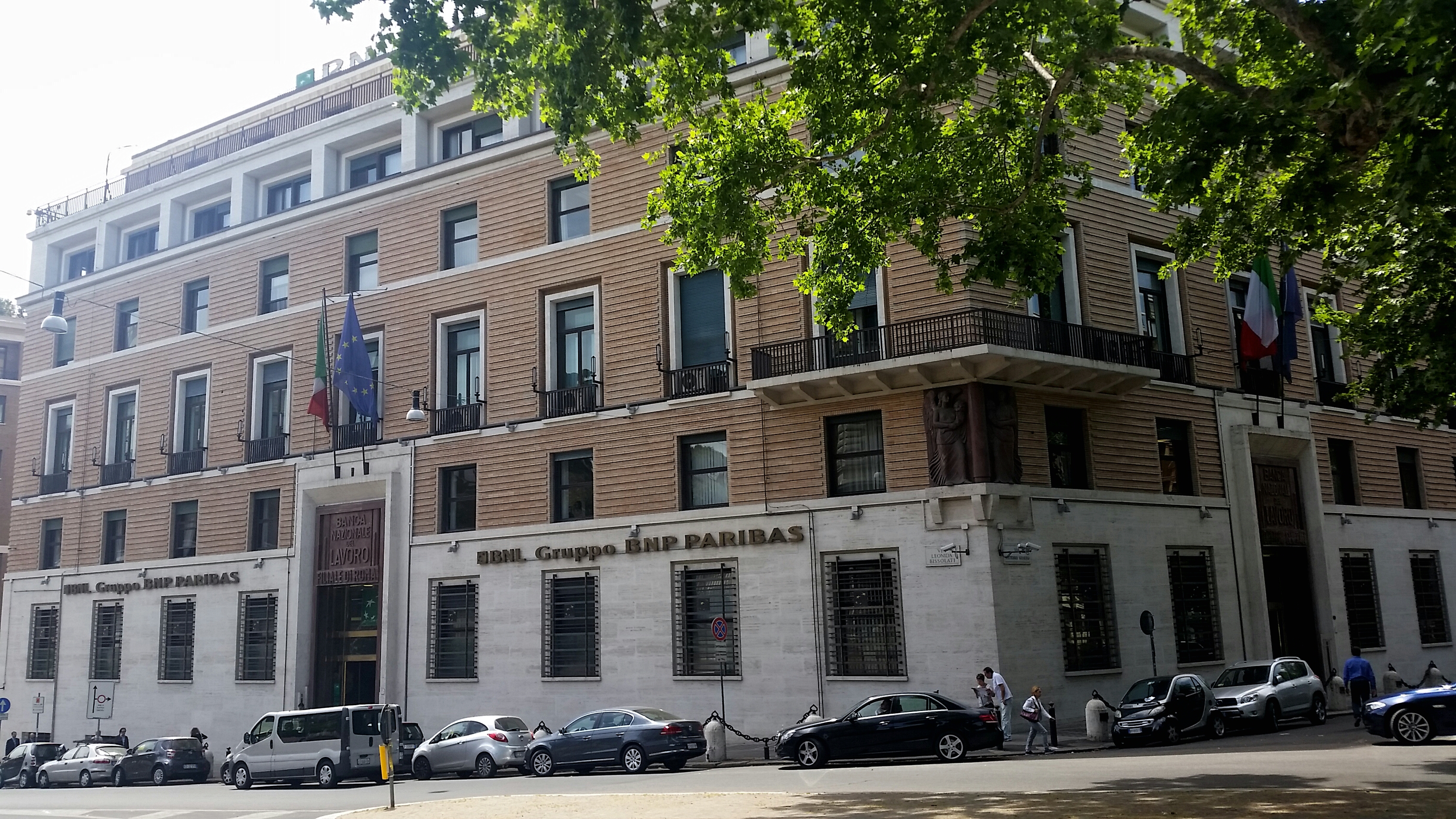|
Société Générale
Société Générale S.A. (), colloquially known in English-speaking countries as SocGen (), is a French multinational universal bank and financial services company founded in 1864. It is registered in downtown Paris and headquartered nearby in La Défense. Société Générale is France's third largest bank by total assets after BNP Paribas and Crédit Agricole. It is also the sixth largest bank in Europe and the world's eighteenth. It is considered to be a systemically important bank by the Financial Stability Board. It has been designated as a Significant Institution since the entry into force of European Banking Supervision in late 2014, and as a consequence is directly supervised by the European Central Bank. From 1966 to 2003 it was known as one of the ''Trois Vieilles'' ("Old Three") major French commercial banks, along with Banque Nationale de Paris (from 2000 BNP Paribas) and Crédit Lyonnais. History 19th century The bank was founded by a group of industri ... [...More Info...] [...Related Items...] OR: [Wikipedia] [Google] [Baidu] |
Investment Management
Investment management (sometimes referred to more generally as financial asset management) is the professional asset management of various Security (finance), securities, including shareholdings, Bond (finance), bonds, and other assets, such as real estate, to meet specified investment goals for the benefit of investors. Investors may be institutions, such as insurance companies, pension funds, corporations, charities, educational establishments, or private investors, either directly via investment contract, contracts/mandates or via collective investment schemes like mutual funds, exchange-traded funds, or REIT, Real estate investment trusts. The term ''investment management'' is often used to refer to the management of investment funds, most often specializing in private equity, private and public equity, real assets, alternative assets, and/or bonds. The more generic term ''asset management'' may refer to management of assets not necessarily primarily held for investment purpos ... [...More Info...] [...Related Items...] OR: [Wikipedia] [Google] [Baidu] |
European Central Bank
The European Central Bank (ECB) is the central component of the Eurosystem and the European System of Central Banks (ESCB) as well as one of seven institutions of the European Union. It is one of the world's Big Four (banking)#International use, most important central banks with a balance sheet total of around 7 trillion. The Governing Council of the European Central Bank, ECB Governing Council makes monetary policy for the Eurozone and the European Union, administers the foreign exchange reserves of EU member states, engages in foreign exchange operations, and defines the intermediate monetary objectives and key interest rate of the EU. The Executive Board of the European Central Bank, ECB Executive Board enforces the policies and decisions of the Governing Council, and may direct the national central banks when doing so. The ECB has the exclusive right to authorise the issuance of euro banknotes. Member states can issue euro coins, but the volume must be approved by the EC ... [...More Info...] [...Related Items...] OR: [Wikipedia] [Google] [Baidu] |
European Banking Supervision
European Banking Supervision, also known as the Single Supervisory Mechanism (SSM), is the policy framework for the prudential supervision of banks in the euro area. It is centered on the European Central Bank (ECB), whose supervisory arm is referred to as ECB Banking Supervision. EU member states outside of the euro area can also participate on a voluntary basis, as was the case of Bulgaria as of late 2023. European Banking Supervision was established by Regulation 1024/2013 of the Council, also known as the SSM Regulation, which also created its central (albeit not ultimate) decision-making body, the ECB Supervisory Board. Under European Banking Supervision, the ECB directly supervises the larger banks that are designated as Significant Institutions. The other banks, known as Less Significant Institutions, are supervised by national bank supervision, banking supervisors ("national competent authorities") under supervisory oversight by the ECB. As of late 2022, the ECB directly ... [...More Info...] [...Related Items...] OR: [Wikipedia] [Google] [Baidu] |
Financial Stability Board
The Financial Stability Board (FSB) is an international body that monitors and makes recommendations about the global financial system. It was established in the 2009 G20 Pittsburgh Summit as a successor to the Financial Stability Forum (FSF). The Board includes all G20 major economies, FSF members, and the European Commission. Hosted and funded by the Bank for International Settlements, the board is based in Basel, Switzerland, and is established as a not-for-profit association under Swiss law. The FSB represented the G20 leaders' first major international institutional innovation. U.S. treasury secretary Tim Geithner has described it as "in effect, a fourth pillar" of the architecture of global economic governance, alongside the International Monetary Fund, World Bank, and the World Trade Organization. Unlike some other multilateral financial institutions, the FSB lacks a treaty basis and formal power, and relies instead on an informal and nonbinding memorandum of und ... [...More Info...] [...Related Items...] OR: [Wikipedia] [Google] [Baidu] |
Systemically Important Financial Institution
A systemically important financial institution (SIFI) is a bank, insurance company, or other financial institution whose failure might trigger a financial crisis. They are colloquially referred to as "too big to fail". As the 2008 financial crisis unfolded, the international community moved to protect the global financial system through preventing the failure of SIFIs, or, if one did fail, limiting the adverse effects of its failure. In November 2011, the Financial Stability Board (FSB) published a list of global systemically important financial institutions (G-SIFIs). In November 2010, the Basel Committee on Banking Supervision (BCBS) introduced new guidance (known as Basel III) that also specifically target SIFIs. The focus of the Basel III guidance is to increase bank capital requirements and to introduce capital surcharges for G-SIFIs. However, some economists warned in 2012 that the tighter Basel III capital regulation, which is primarily based on risk-weighted assets, ... [...More Info...] [...Related Items...] OR: [Wikipedia] [Google] [Baidu] |
Crédit Agricole
Crédit Agricole Group (), sometimes called La banque verte (, , due to its historical ties to farming), is a French international banking group and the world's largest cooperative financial institution. It is the second largest bank in France, after BNP Paribas, as well as the third largest in Europe and tenth largest in the world. It consists of a network of Crédit Agricole local banks, 39 Agricole regional banks and a central institute, the Crédit Agricole S.A.. It is listed through Crédit Agricole S.A., as an intermediate holding company, on Euronext Paris' first market and is part of the CAC 40 stock market index. Local banks of the group owned the regional banks, in turn the regional banks majority owned the S.A. via a holding company, in turn the S.A. owned part of the subsidiaries of the group, such as LCL, the Italian network and the CIB unit. It is considered to be a systemically important bank by the Financial Stability Board. It was the title sponsor of the Cr� ... [...More Info...] [...Related Items...] OR: [Wikipedia] [Google] [Baidu] |
BNP Paribas
BNP Paribas (; sometimes referred to as BNPP or BNP) is a French multinational universal bank and financial services holding company headquartered in Paris. It was founded in 2000 from the merger of two of France's foremost financial institutions, Banque Nationale de Paris (BNP) and Paribas. It also incorporates many other major institutions through successive acquisitions, including Fortis Bank in Belgium, Direkt Anlage Bank in Germany, Banca Nazionale del Lavoro in Italy, Banque Générale du Luxembourg in Luxembourg, and Türk Ekonomi Bankası in Turkey. The group has also been present in the United States through its subsidiaries Bank of the West until 2023 and First Hawaiian Bank until 2019. With 190,000 employees, the bank is organized into three major business areas: Commercial, Personal Banking & Services (CPBS); Investment & Protection Services (IPS); and Corporate & Institutional Banking (CIB). BNP Paribas is listed on Euronext Paris and is a component of th ... [...More Info...] [...Related Items...] OR: [Wikipedia] [Google] [Baidu] |
Financial Services
Financial services are service (economics), economic services tied to finance provided by financial institutions. Financial services encompass a broad range of tertiary sector of the economy, service sector activities, especially as concerns financial management and consumer finance. The finance industry in its most common sense concerns commercial banks that provide market liquidity, derivative (finance), risk instruments, and broker, brokerage for large public company, public companies and multinational corporations at a macroeconomics, macroeconomic scale that impacts domestic politics and foreign relations. The extragovernmental power and scale of the finance industry remains an ongoing controversy in many industrialized Western economies, as seen in the American Occupy Wall Street civil protest movement of 2011. Styles of financial institution include credit union, bank, savings and loan association, trust company, building society, brokerage firm, payment processor, many ty ... [...More Info...] [...Related Items...] OR: [Wikipedia] [Google] [Baidu] |
Universal Bank
A universal bank is a type of bank which participates in many kinds of banking activities and is both a commercial bank and an investment bank as well as providing other financial services such as insurance. These are also called full-service financial firms, although there can also be full-service investment banks which provide wealth and asset management, trading, underwriting, researching as well as financial advisory. The concept is most relevant in the United Kingdom and the United States, where historically there was a distinction drawn between pure investment banks and commercial banks. In the US, this was a result of the Glass–Steagall Act of 1933. In both countries, however, since the 1980s the regulatory barrier to the combination of investment banks and commercial banks has largely been removed, and a number of universal banks have emerged in both jurisdictions. In other countries, the concept is less relevant as there was no regulatory distinction between inv ... [...More Info...] [...Related Items...] OR: [Wikipedia] [Google] [Baidu] |
Multinational Corporation
A multinational corporation (MNC; also called a multinational enterprise (MNE), transnational enterprise (TNE), transnational corporation (TNC), international corporation, or stateless corporation, is a corporate organization that owns and controls the production of goods or services in at least one country other than its home country. Control is considered an important aspect of an MNC to distinguish it from international portfolio investment organizations, such as some international mutual funds that invest in corporations abroad solely to diversify financial risks. Most of the current largest and most influential companies are Public company, publicly traded multinational corporations, including Forbes Global 2000, ''Forbes'' Global 2000 companies. History Colonialism The history of multinational corporations began with the history of colonialism. The first multinational corporations were founded to set up colonial "factories" or port cities. The two main examples were the ... [...More Info...] [...Related Items...] OR: [Wikipedia] [Google] [Baidu] |
Affiliates
In the broadcasting industry (particularly in North America, and even more in the United States), a network affiliate or affiliated station is a local broadcaster, owned by a company other than the owner of the network, which carries some or all of the lineup of television programs or radio programs of a television or radio network. This distinguishes such a television or radio station from an owned-and-operated station (O&O), which is owned by the parent network. Notwithstanding this distinction, it is common in informal speech (even for networks or O&Os themselves) to refer to any station, O&O or otherwise, that carries a particular network's programming as an affiliate, or to refer to the status of carrying such programming in a given market as an "affiliation". Overview Stations which carry a network's programming by method of affiliation maintain a contractual agreement, which may allow the network to dictate certain requirements that a station must agree to as part of th ... [...More Info...] [...Related Items...] OR: [Wikipedia] [Google] [Baidu] |






